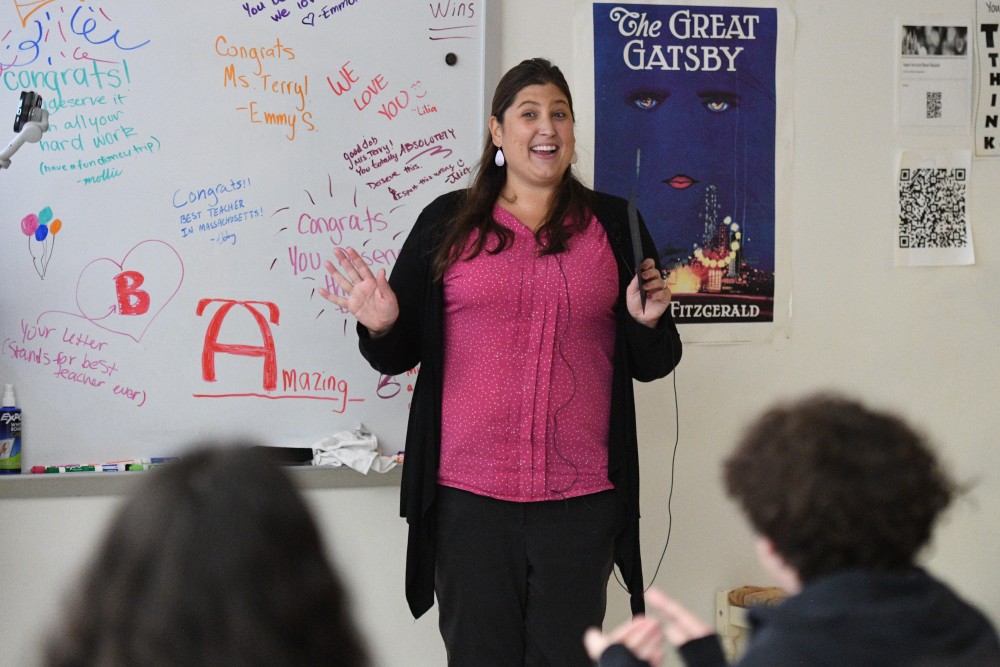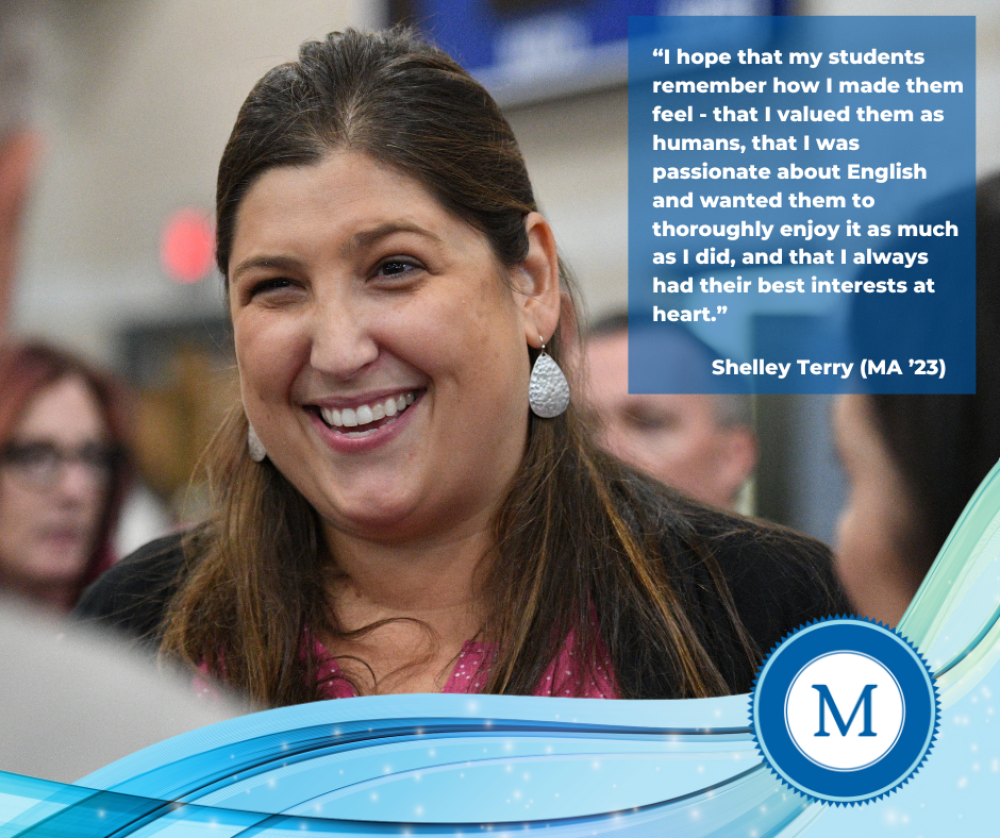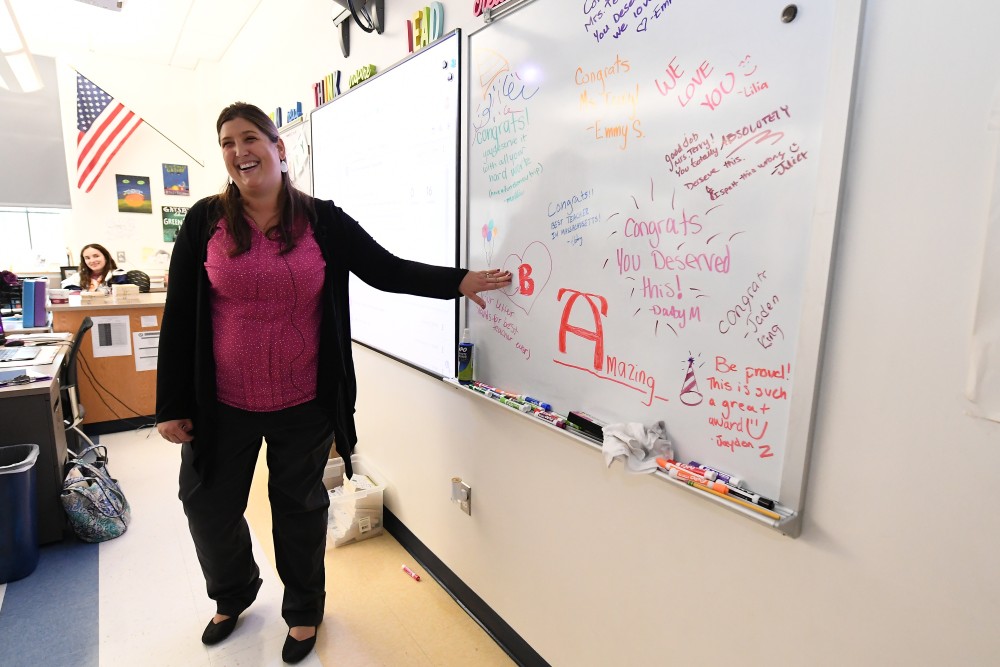Spotlight: Shelley Terry (MA '23)
June 26, 2024
Inspired by her high school English teachers, Shelley Terry found her calling to teach English and Language Arts through stories like The Great Gatsby and Shakespeare. Now as a teacher herself, Terry fosters a love for reading and literature in her classroom using the same stories her teachers once shared with her as a student. Shelley received a 2023-24 Massachusetts Milken Educator Award in Plymouth on October 20, 2023.
Milken Family Foundation: How have students responded since your Milken Educator Award surprise?
Shelley Terry (MA '23): It is six months later and I still have one student that yells “Twenty-five thousand G: Mrs. Terry never broke again!” down the hallway every time he sees me. It’s embarrassing, but puts a smile on my face. The kids have been so kind and even students I don’t have in the school have congratulated me.
MFF: Who are your role models as an educator?
Terry: I am so fortunate to have had some amazing educators in my life. My fourth grade teacher, Mrs. O’Brien (who I am lucky enough to still be in contact with), really made me love school. Everything we did in her class was engaging and I have fond memories of various activities that made me love learning and coming to school each day. She is the reason why I wanted to become a teacher. When I entered high school, two English teachers really influenced me the most - Mr. Hopkins and Mrs. Kalmer. They brought Shakespeare and "The Great Gatsby" to life. I am the teacher I am today because of them. I wanted to be an 11th grade American Literature teacher and make my students love the story of Gatsby as much as I do. I am currently living that dream.
MFF: Tell us about your first year of teaching.
Terry: The first year of teaching was rough. I was 22 years old when I began and Plymouth North High School gave me a chance despite me not having a full student teaching experience. People would joke about the high school I went to being a country club - no fights, nearly everyone following rules, and 99% of students went to four-year colleges. My first year teaching I saw weekly fights, kids being disrespectful, and many not engaged in school the way I had been. It was a struggle. During the first year I remember saying, “Why would anyone stay here?” I am now finishing my 17th year at Plymouth North and wouldn’t want to be anywhere else. I love the fact that I can help a wide variety of students. The relationships I have made with so many last beyond graduation.
MFF: What do you hope students remember from their time with you?
Terry:The quote by Maya Angelou always stuck with me: “I’ve learned that people will forget what you said, people will forget what you did, but people will never forget how you made them feel.” Ideally, I hope that my students will remember what I taught them about "The Great Gatsby" or the field trips and lessons I engaged them with during my class. However, 30 years from now, I hope that my students remember how I made them feel: that I valued them as humans, that I was passionate about English and wanted them to thoroughly enjoy it as much as I did, and that I always had their best interests at heart.

MFF: Your Plymouth North News course teaches students the ins and outs of broadcast journalism. Can you tell us more about the inspiration behind creating these opportunities? What is it like to see students go on to enter careers in journalism because of your influence?
Terry: I remember getting a phone call while at the University of New Hampshire saying I would be teaching print journalism and I was thrilled. What I didn’t realize is that six months later I would be done teaching the basics of print journalism and wanted to try something completely different: broadcast journalism. I trained myself how to edit, grabbed a table out of the trash, some fabric from Walmart, and Plymouth North News (PNN) was born. I saw PNN as a way to create a community at the school, letting students know about important happenings and sports scores. I wanted to give my students a fun way to engage with learning and had no idea how far it would come with some additional funding and a new school with a full studio. It is amazing to see my former students working in a variety of careers - editor for The Boston Globe, video editor for WGBH (PBS), filmmakers, communications directors all over the country, production coordinator for Netflix – the list goes on and on. I have never been more proud of them, but I had very little to do with most of it. Deep down they had the drive, dedication and passion to achieve these amazing opportunities.
MFF: What advice would you share with people who are interested in becoming teachers?
Terry: So many teachers first answer this with, “Don’t,” but even with the change in education over the last five years and knowing how much more difficult it is now than when I started - I say, do it. There is no other job in the world where you get to truly make a positive impact on a large number of people. In my time teaching, I have probably already taught over 1,500 students with another 1,500 to go. Those 3,000 kids will hopefully go off to influence others. Many of my students have gone on to become teachers, so the butterfly effect continues. Don’t let people discourage you: It’s hard work, but it’s important work.

MFF: Are you working on any interesting initiatives or new projects? Is there anything else you want to share about your classroom?
Terry: I am not working on anything formal. I presented to the Massachusetts Board of Elementary and Secondary Education and discussed how cell phones are the worst thing to happen to education and my global concern to the effects devices have on the minds of our students.
Here is an excerpt from my speech: “While cellphones in the classroom are, in my opinion, the worst thing to happen in education in, well, forever, my concern is more global in regards to the effects devices have on the minds of our students. Of course, I understand that technology has a time and place in the classroom and I am very appreciative that our classrooms have moved 1-1. However, the time students spend on cell phones has truly negatively affected learning. To combat this, I have a “cell hotel” in my classroom and ask my students to please check- into the hotel at the beginning of class and give their cell a time to rest. It’s been a fight, but it’s worked to create a classroom environment to show my students that learning is important and Snapchat, Instagram likes, and texts from mom can wait.
Watch our interview with Shelley Terry (MA '23) on the day of her Milken Award notification:
Don’t miss any new articles and updates from Milken Educator Awards:


